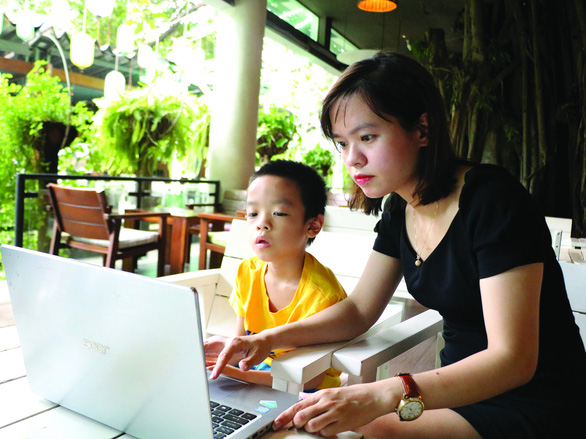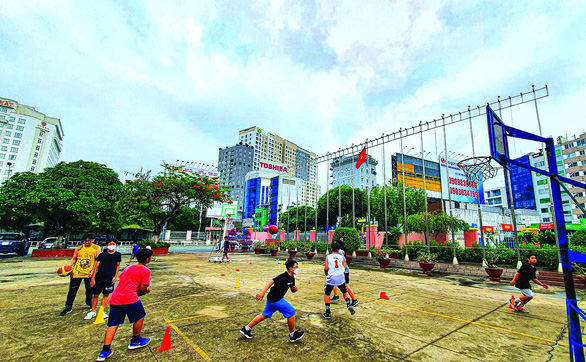Homeschooling is no longer a strange concept in Vietnam, but the COVID-19 pandemic has turned many Vietnamese parents into homeschoolers.
The largest Facebook page for homeschooling attracts nearly 70,000 followers.
Study road map
After having dinner, at 7:00 pm, Pham Thi Diem, an office worker living in District 12, Ho Chi Minh City, and her nine-year-old son start studying online.
The two study with friends and foreign teachers in a homeschooling program licensed in the United States.
Up to now, Diem’s son has been 'living in Vietnam, studying [math and English pronunciation] in the United States' for more than six months.
For two hours in class, Diem is her son’s classmate. When the teacher is giving lessons, she also writes them down.
In speaking, the two read the words in chorus and then answer questions and do exercises together.
“It takes a lot of work for my son to study like today," Diem recalled her son’s early days of studying the American program on his own.
Her son was not into studying. After turning on his computer and listening to the lesson, he started to yawn. She had to sit next to him to encourage him.
Later, she came up with the idea of studying together to get her son involved more and measure his progress at the same time.
She was in charge of English while her husband undertook Chinese teaching. They arranged alternately, one day for the American program and one day for Chinese.
Diem said that she does not really trust some foreign language centers due to incorrect teaching and pronunciation.
“Besides, with the same amount of money to study at the centers, why not let your child learn the original program of the native country?” she said.
Truong Hoang Minh, who lives in Thu Duc City under Ho Chi Minh City, provided her two children with full-time homeschooling based on a road map she has created for the next two years.
She thinks that early every morning is the time that her children will gain the most knowledge. Thus, she lets them study math and science.
In the early afternoon, they learn art and music, followed by basketball and swimming lessons at the end of the day.
From just teaching her children, she gathered a group of about seven students to have fun while studying. All of them are homeschoolers in Thu Duc City.
Every day, they will be in harmony with nature, while connecting with each other to help make up for the lack of communication in the process of online learning and to train their ability to work in groups as well.
Vuong, a freelancer in Ho Chi Minh City, has a son who is a second grader at Hong Ha Elementary-Secondary School in Binh Thanh District.
Since January 2021, he has let his son study the American homeschooling program in the evenings with the average of two hours per session.
There are 10 students from different regions in each class. Each period involves checking previous lessons, teaching new knowledge, and doing quizzes and extra exercises.
As for practice, the school also gives students software to experience 3D experimental space.
“There is an online library for students to find and read books if they want,” said Vuong.
Cases in need of homeschooling
According to education expert Bui Khanh Nguyen, homeschooling is often suitable for children who are able to learn independently.
The tuition fee for an online school is about VND250 million (US$10,560) per year, while international programs at private schools in Ho Chi Minh City cost about VND600-800 million ($25,360-33,815) a year.
Dr. Nguyen Thi Thu Huyen said that homeschooling should be more accepted in Vietnam.
|
|
| A supplied photo shows students attending one of the homeschooling activities held by Hoang Minh’s group. |
In addition to giving parents more options, it can help children with special needs.
Many children are slow on the uptake, making life tough for them to keep up with their peers in public schools in the first few years.
If homeschooling is available, parents may get their children homeschooling in grades one and two for the first three to four years.
After their knowledge and skills improve, students can transfer to public schools.
COVID-19 behind homeschooling spike
Education expert Bui Khanh Nguyen told Tuoi Tre (Youth) Weekly that his son left a public school and is attending a full-time homeschooling program.
His son, in grade eight, is studying an American program launched by an 'online school' with global enrollment.
The schedule is from 10:00 am to 5:00 pm with separate homeroom teachers. On the test-taking day, students do the test online, while the school will send their exam papers to independent units for marking.
As for British programs, students can take the test at the British Council as private candidates.
“The homeschooling community in Vietnam has expanded to about 10,000 children. Most parents supply their children with both foreign and Vietnamese programs simultaneously,” Nguyen said.
Pham Hieu Thi, a Dong Nai resident and an administrator of many homeschooling parent groups on social networks, saw a sharp increase in the number of group members after COVID-19.
Some groups reported a two- or three-fold rise in the number of members and posts compared to the pre-pandemic period.
Thi has allowed her ninth-grade child to join full-time homeschooling for two years after four years of 'part-time' homeschooling, meaning attending school but studying online at home.
She lets her child study both Abeka and Acellus homeschooling programs which are reputable in the United States.
Yet she realizes that they lack reading comprehension of literary works, so she adds foreign literature lessons.
She also spends time taking her child to sharing and discussing courses held in Ho Chi Minh City.
Knowing that her child is interested in agriculture, she allows him to visit the cyclical organic farms of young people.
Should homeschooling be recognized?
Dr. Nguyen Thi Thu Huyen at the University of East Anglia in the UK stated that in developed countries, homeschooling is credited as an alternative educational program, but it does not mean that parents can teach at will.
Enjoying compulsory general education is the right of children. Therefore, families who do not want to send their children to a formal school will have to explain it to them or be committed to using another method of education.
If homeschooling is chosen, parents are required to report their situations to local and welfare management organizations for verification.
After years of working in education in Vietnam, Dr. Huyen noticed that more and more parents are contacting her for advice on full-time homeschooling.
Their backgrounds are diverse but mostly belong to a few main groups.
The first group involves parents who studied abroad or are fluent in English, so they are quite confident letting their children study at home.
Most of them have active financial resources, are not working full-time, and can closely follow their children’s studying.
This group decides from the beginning that their children will not return to a public school.
When necessary, they will send their children abroad to continue their learning. This group is currently not large.
The second group consists of those who choose homeschooling to follow the trend. There is an increasing tendency in this sector. Parents in this group are well-off in terms of finance and time.
However, they do not possess education expertise. They create a teaching program by being introduced or self-evaluating lessons that they think are good for their children.
If parents fail to homeschool their children by themselves, they will look for a tutor while they make them 'an editor' of the learning program, Huyen said.
The third group includes the parents who bring their children to small groups of 10 or more, called 'a school,' but it operates as a skill education center.
Most schools are far from urban areas, partly to avoid the inspection of education management units.
These schools apply the Steiner method, which means students can play, paint, learn music, English and interact with nature. However, these programs are feeling-driven and not considered formal.
The former vice-principal of an international school in District 7, Ho Chi Minh City said that she had met up with three parents who sent their children to a Steiner school at an early age and wanted to transfer back to a regular school.
When taking entrance exams, these students disappointed their parents.
Their foreign language ability was not as good as their peers and even worse, they lacked many skills and knowledge.
They were great at imagination and creativity, but they lacked subject knowledge compared to their counterparts.
She added that many international schools are often quite cautious when accepting homeschooled children now, especially from the secondary level.
Parents frequently brag that their children are progressing very quickly; however, to experts, many of them are not up to the standard.
In other words, the success of homeschooling is usually heavily subjective on the part of parents.
Like us on Facebook or follow us on Twitter to get the latest news about Vietnam!




















































